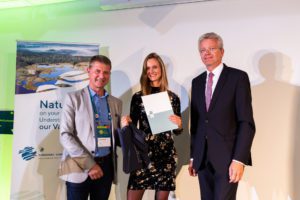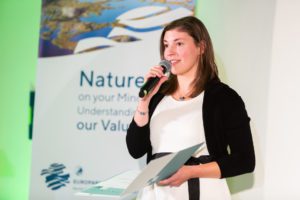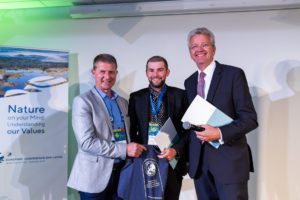Alfred Toepfer Natural Heritage Scholarships: Winners 2019
The winner of the Alfred Toepfer Natural Heritage Scholarship in Jurmala, Latvia - EUROPARC Conference 2019
Each year the EUROPARC Federation, with support from the Alfred Toepfer Stiftung F.V.S., awards three Alfred Toepfer Natural Heritage Scholarships to promising young conservationists, who are committed to working for the benefit of Protected Areas. The aim of the scholarships is to enhance international cooperation and to advance the quality, innovation and European dimension of Protected Area (PA) management.
Alfred Toepfer Natural Heritage Scholarships winners 2019
Myrthe Fonck has been working as Ecologist and nature advisor at PWN (Zuid-Kennemerland National Park) for the past two years. Her main activities include advisory tasks regarding nature and recreation management, research and strategy. During her study visits to the UK, Sweden and Italy, Myrthe wants to investigate the potential of citizen science for nature conservation, and understand the requirements for successful citizen science projects.
Citizen science has the potential to attract and involve younger generations.
Educated as a researcher, she believes that science offers an excellent opportunity to involve local residents, and especially the younger generations, in conservation activities. As the outcome of her study, Myrthe hopes to integrate the techniques such as crowd sourcing and volunteer thinking into regular PA management practices.

Sustainable Development in Protected Areas
Marie Micol is a Future Landscapes Project Assistant at National Association for Areas of Outstanding Natural Beauty. At the moment, she is also finishing her Postgraduate Diploma in Conservation and Forest Protection at Harper Adams University. Through the study visits to parks and nature reserves in France, Italy, Germany and the United Kingdom, Marie aims to develop a framework for landscape management approaches, replicable in different regions based on the different perceptions of “landscape” across Europe.
Landscape approaches encompass social, economic and environmental processes managed towards sustainable development.
She works on the assumption that some cultures naturally bring stakeholders together and collaborate to deliver integrated landscape management, whilst others initiate this approach rather after a legislative or institutional change. Her report should allow Protected Areas around Europe to develop their individual thinking about landscape management and facilitate the implementation of the European Landscape Convention.

Parks for People
Matthew Ross works as Learning & Discovery Ranger at Peak District National Park, which means that he delivers and coordinates school visits, Junior Rangers, family events and community outreach. To improve his work, Matthew would like to study how different parks engage their visitors, especially young people and urban communities.
Engaging young people with our special landscape is the key to a sustainable future for our environment and our society.
For his study visits, he chose Sächsische Schweiz in Germany and Duna-Ipoly Nemzeti Park near Budapest because of their particular “Periurban Park” status. As the outcome, Matthew hopes to produce a booklet that will compare and contrast the ideas, strategies and methods of the three parks, and share examples of engagement work with practical ideas and inspiration for other parks.
